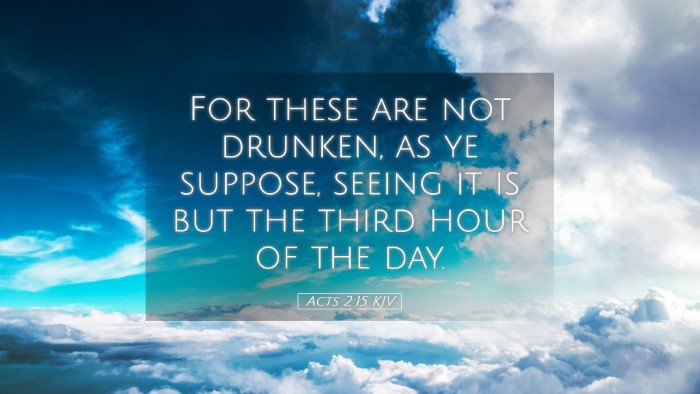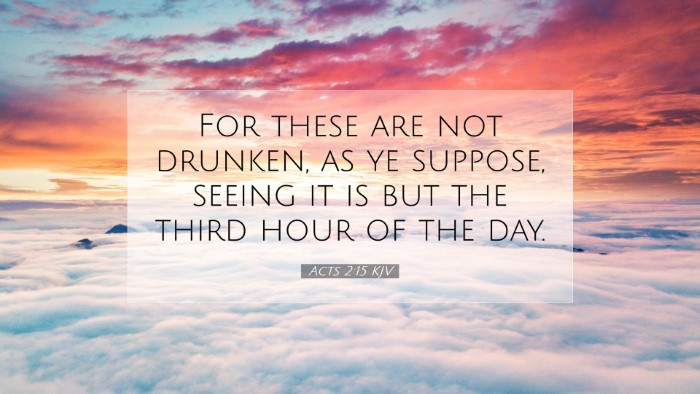Commentary on Acts 2:15
Verse: "For these are not drunken, as ye suppose, seeing it is but the third hour of the day."
Contextual Analysis
The backdrop of Acts 2:15 is the Day of Pentecost, marking the outpouring of the Holy Spirit upon the apostles and early believers. This event fulfills the prophecy of Joel and signifies the initiation of a new era in salvation history. Peter responds to the crowd's bewilderment over the apostles speaking in different tongues, emphasizing the divine nature of this phenomenon over any worldly interpretation of drunkenness.
Commentary Insights
Matthew Henry's Commentary
Matthew Henry emphasizes that the phenomenon of speaking in tongues is a direct result of the Holy Spirit's empowering presence and should be viewed as a work of God rather than an act of human indulgence. He notes that the specific mention of time (the third hour) reflects the early morning setting of this transformational event, serving to logically counter the notion of drunkenness. This time reference also connects to the Jewish custom of prayer, where this hour is set aside for devotion, further underscoring the divine intention behind the events.
Albert Barnes' Commentary
Albert Barnes expands on the implications of Peter’s defense, stating that the accusation of drunkenness is a blatant dismissal of the miraculous. He explains that the hour of day, being early, logically dismisses the likelihood of inebriation among the followers. Barnes points out that Peter’s insistence on the sobriety of the apostles reflects a deeper theological truth: the actions of God through the Holy Spirit are often misinterpreted by the worldly mind. This serves as a teaching moment for the church regarding how to properly discern the movement of the Holy Spirit.
Adam Clarke's Commentary
Adam Clarke offers a rich historical perspective on the significance of early morning rituals, linking the events of Pentecost to the solemnity of worship observed within Judaism. He explains that such an early hour would be inappropriate for drunken behavior, particularly among devoted followers. Clarke also highlights that, throughout history, when God moves powerfully, it often draws skepticism and ridicule from those who do not perceive the spiritual realities at play. This admonition serves as a reminder for the church to maintain discernment and faith amid confusion.
Theological Implications
This verse prompts several theological reflections:
- Divine Intervention: The events of Pentecost signify God’s direct intervention in human affairs, underscoring that the workings of the Holy Spirit often defy human understanding.
- Witness to the World: The ability to speak in varied languages to different peoples serves as a powerful testament to the universality of the Gospel message, indicating that salvation is available to all nations.
- Discernment in Spiritual Matters: Believers are called to discern the actions of the Spirit amidst skepticism and misunderstanding from the secular world.
- Empowerment for Mission: The Holy Spirit empowers believers not for their own edification but for the mission of witnessing to the ends of the earth.
Practical Applications
For pastors and theologians, the insights from Acts 2:15 inspire several practical applications:
- Emphasizing Spiritual Discernment: Cultivate an atmosphere where believers can discern the workings of the Holy Spirit and recognize that divine acts may not always align with human logic.
- Engaging with Skepticism: Equip church members to respond to skepticism and ridicule with grace and sound understanding, echoing Peter's defense.
- Creating Opportunities for Worship: Promote community worship practices that create space for the Spirit's movement, recognizing the significance of prayer times like the third hour.
- Mission-Driven Ministry: Encourage believers to actively participate in evangelism, inspired by the original apostles' mission to proclaim the Gospel to diverse cultures.
Conclusion
Acts 2:15 serves not only as a pivotal moment in the early church but also stands as a timeless invitation for believers to engage with the Holy Spirit’s work in their lives. As leaders and scholars reflect on this verse, they are reminded of the rich tapestry of God's redemptive purposes that transcend cultural boundaries and human expectations. The challenge remains for the church to continually embrace the transformative power of the Holy Spirit, discerning His voice amid the noise of the world.


